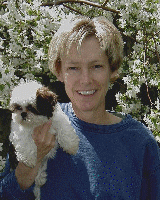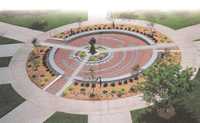
Julie Wright
is honored with a Large Paver from Anonymous donors, Deborah Diane Byers, Jill L. Champley, Ginger L. Cox, Deemathie W. Desilva, James W. Kelley, Ronald R. Kopita, Michael R. Madecky, Dan Mehl, Corinne L. Nilsen, Jill Pletcher, Susan M. Ratz, Delinda Lea Royse, Christine Schneikart-Luebbe, Margaret Wright and Marilyn Ruth Yourdon.

In the first book of Chronicles we read: "We are exiles in this land, all of us sojourners." Today we say farewell to Julia C. Wright, who completed her pilgrimage on April 23, 2002.
Julie began her sojourn in this world with her birth on September 26, 1948 at St. Luke Hospital in Chicago Illinois, the fourth daughter born to Howard and Margaret Flanagan Wright, who nurtured this gift of God's life to them with tenderness and love. Julie's stay in Chicago was brief for at the age of six weeks she and her family moved to Kansas City, Missouri.
Even though Julie did not become a world traveler in a geographical way, traveling as a pilgrim, growing ever more fully in spiritual and personal dimensions was a hallmark of her life. This growth did not come without some struggle and pain. Her mother recalls how difficult it was for Julie (and for her mother) when she had to go to her first day of school. As the youngest of the "big" kids, it was a difficult parting on that early September morning in Kansas City in 1954.
Moving to Wichita in 1966 to attend Newman University (then known as Sacred Heart College) was another big step forward. It was here that Julie was able to discover qualities within her she had not realized existed. She became a leader among her college peers, including being director of one of the residence halls.
This growth, this traveling continued with her enrollment as a graduate student at Wichita State University in The College of Education, receiving a Master of Education in Counseling and School Psychology in 1990. During her graduate student days she worked as an intern in the Office of Career Services, with Wayne Carlisle as her mentor. Upon her graduation she became a member of the staff, eventually holding the position of Assistant Director. Guiding students as they searched out their own career paths became her passion. Julie felt that now it was time to give to others as had been so generously given to her. She was very conscientious in her work and never violated the trust placed in her. Students knew they would receive the best guidance possible.
Since she had been mentored so well, Julie in turn became a mentor for others as they grappled with career decisions. Dr. Stephanie Brown from the Counseling and Psychological Services office of San Diego State University attests to this in an email sent last week:
Hi Julie:
I recently asked about you and was deeply saddened to learn that you have been ill. I wish I could be there to offer you a hug or support. I know that we only knew one another for a brief time. But your passion about your beliefs, for your work, and helping others (including me), made a lasting impression on me. You modeled a level of commitment and passion that I can only hope to achieve someday. It is something that I deeply admire. You probably have no idea how much your assistance and encouragement meant to me during those last few months at WSU. You really helped me to have confidence in myself through the job search process and reminded me that I have something to contribute. In fact, you were my first personal experience with career services...almost four years after beginning my career. You will remain in my thoughts and in my heart." --- Stephanie Brown
Obviously, it was distressing when Julie learned in 1995 that she had breast cancer. She took on the challenge of overcoming it, and for nearly six years it appeared she had been successful. But that was not to be the case. Tests taken last July showed the cancer had returned, moving to the bone. She decided to at least give curative treatment a try, yet always being clear that there would not be "heroic measures." She echoed the words of the poet Dylan Thomas: "Do not go gentle into that good night; rage, rage against the dying of the light."
A few weeks ago she decided that "enough was enough". It was time to go into that good night. Death would no longer be the enemy. Death would now be a friend, a healer. With courage she decided to forego further curative treatment and opted to be cared for at home by hospice. Under the expert care of the staff of Harry Hynes Memorial Hospice the terrible pain from the pressure in her head caused by the cancer was brought under control. She lived her final days in great peace and comfort, saying goodbye to her family and the many friends in the circle of her life.
She often stated in the last weeks of her life that "This has gone on long enough." She was not afraid of death; she only wanted to die comfortably. She echoed the words of St. Paul: "Death, where is your victory; death where is your sting?" She was ready to travel that final leg of her life's journey. Her most pleading request near the end was: "I want to go home." She knew she was in her own house, but it was not her final home. She still had some traveling to do, and when asked if "going home" meant dying and going to heaven, she vigorously replied in the affirmative.
Julie only traveled in this world for a little over 53 years. Her loved ones left behind wish she could have traveled with them for many more years. Her mother, her five sisters and one brother are sad at her parting, but rejoice that now she has the gift of a new life, reunited with her father who preceded her in death in January 1995.
Throughout the final weeks of her illness Julie frequently told her family members that she "wanted to do this right." She wanted to maintain her dignity and live her life to the full to its very last minute. And that she did. Her courage and example will always continue to be an inspiration. As the banner carried by the WSU contingent in the 2001 "Race for Cure" stated: Julie had "The Wright Stuff."
One of Julie's favorite pastimes (in addition to her love of golf) was walking. The overarching trees lining the paths in the Sedgwick County Park became her cathedral where she often met and walked with the Lord. It was here, as she often stated, that she was able to sort things out and get her head on straight.
There is sadness in the parting, but we can also take consolation that Julie is now fully healed. Her body had failed her over the course of these last few months. It could no longer contain her spirit. She is now walking freely and fully in God's presence. Her wish has been granted: she has gone home. We give thanks to God for the gift of her life with us these past 53 years.










